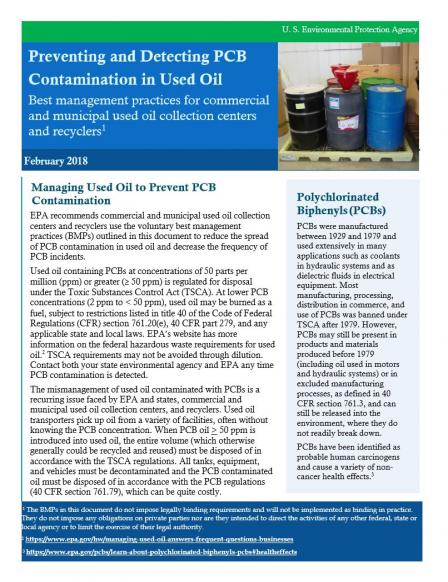EPA developed a fact sheet for preventing and detecting PCB contamination in used oil. The fact sheet provides best management practices (BMPs) for commercial and municipal used oil collection centers and recyclers.
 Used oil containing PCBs at concentrations of 50 parts per million (ppm) or greater is strictly regulated for disposal under the Toxic Substances Control Act (TSCA). These regulations may not be avoided through dilution of PCB concentrations greater than 50 ppm to less than 50 ppm.
Used oil containing PCBs at concentrations of 50 parts per million (ppm) or greater is strictly regulated for disposal under the Toxic Substances Control Act (TSCA). These regulations may not be avoided through dilution of PCB concentrations greater than 50 ppm to less than 50 ppm.
The mismanagement of used oil contaminated with PCBs is a recurring issue faced by EPA and states, commercial and municipal used oil collection centers, and recyclers. Used oil transporters pick up oil from a variety of facilities, often without ensuring that the oil is free of PCB contamination. When PCB oil greater than 50 ppm is introduced into non-PCB oil, the whole volume (which otherwise generally could be recycled and reused) must be disposed of in accordance with the TSCA regulations, which can be quite costly. Additionally, all tanks and trucks in which the oil was held must be appropriately decontaminated.
To minimize contamination of used oil with PCBs and reduce the spread of PCB contamination in used oil, EPA recommends the best management practices (BMPs) outlined in the fact sheet for commercial and municipal used oil collection centers, and recyclers, as feasible. These BMPs are completely voluntary but are in the best interests towards reducing costly PCB-contaminated used oil incidents. The fact sheet is linked below. For more information, contact ORCRPCBs@epa.gov.
You may need a PDF reader to view some of the files on this page. See EPA’s About PDF page to learn more.